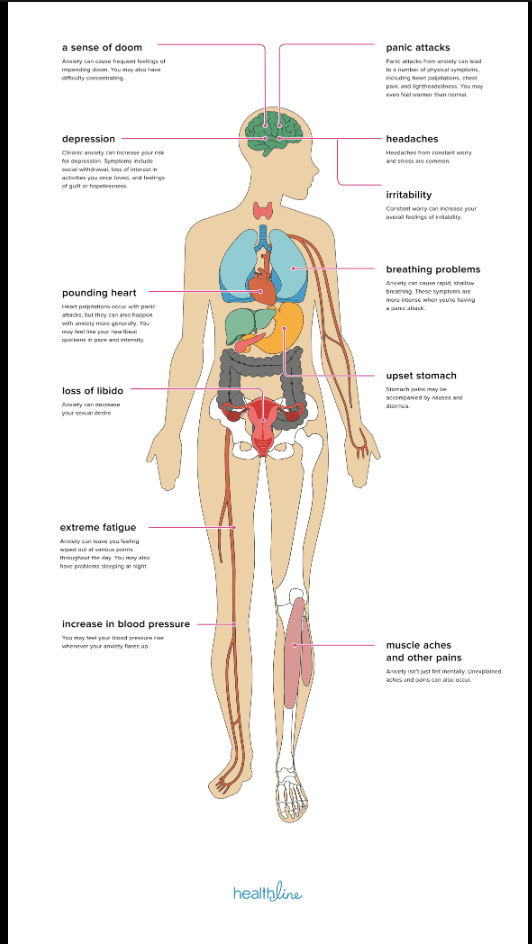What does anxiety look like?
What does anxiety look like?
10 min read
“Anxiety looks like so many different things for my teen. Sometimes its anger, sometimes it’s isolation, sometimes excitement. It’s really hard for me to tease out what’s beneath the behavior sometimes” - Parent quote
One of the hallmark challenges of anxiety in teens is the numerous ways in which it can present itself. We’ve heard parents talk about the range of experiences their teens have with anxiety and how difficult it can be to pinpoint when anxiety is happening. Though we know that no list can be exhaustive when it comes to identifying this type of experience, we wanted to highlight seven of the most common signs of anxiety that Somethings parents report to us.
Excessive Worrying
Worrying about things to come in the future is a totally normal experience. However, worrying can become extreme with teens who are navigating anxiety. Teens might worry relentlessly about school, relationships, health, or the future and struggle to prevent their worries from spiraling. Teens who suffer from excessive worrying might find it difficult to do the things that they want to do because they are worried about something that could happen to them or someone else.
Avoidance Behaviors
It’s normal to want to avoid situations that cause discomfort or pain. Avoiding something painful can be an adaptive strategy, providing temporary relief. However, teens with anxiety may take avoidance to the extreme and avoid many situations throughout their life, causing disruption and difficulty in navigating adolescence. This strategy might reinforce the anxiety and prevent the teen from participating in things that otherwise would bring them closer to flourishing. One example might be the teen who avoids the school dance due to their anxiety, which provides them temporary relief but forces them to miss out on a once-in-a-lifetime experience with their friends.
Irritability and Restlessness
Irritability and restlessness often get overlooked as an outward manifestation of anxiety. Teens feeling uncomfortable or anxious may become irritable, have short tempers, or lash out at small things. Often, these teens get labeled as having “behavior problems” or “bad manners” when in reality they are navigating a challenging bout of anxiety. We’ve heard from many of our parents how powerful it was for them when they realized that their teen’s outbursts were just an expression of their anxiety, and allowed them to feel even more compassionate.
Difficulty Focusing
Similar to irritability and restlessness, anxiety can challenge a teen's ability to concentrate, making them easily distracted, forgetful, or unable to complete tasks on time.
Changes in Eating and Sleeping Patterns
As we mentioned in Part 2, anxiety can disrupt eating habits and sleep patterns, leading to overeating, under eating, or sleep difficulties. These dysregulations in the body's natural circadian rhythm can throw teens out of balance and cause their anxiety to flare up. It’s a viscous cycle as teens struggle to get their eating and sleeping patterns on track which causes more anxiety and on and on. Any major change to these habits could indicate an experience with anxiety.
Physical Symptoms
Anxiety can manifest in physical symptoms such as headaches, fatigue, muscle tension, stomachaches, or sweating. These physical symptoms can make it difficult to identify the cause as there are many other ailments that might cause these physical symptoms. However, anxiety is a whole body experience. If your teen is having physical symptoms in conjunction with any other symptoms, it’s worth taking note of.
What to look out for? Baseline.
“If your teen used to be very engaged and is now isolated, it’s a sign. It’s the subtle shifts that make me think something is bubbling below the surface.” - Ahmed Khan
An important concept that we will talk about more in this guide is the idea of a baseline of behavior. All this means is that your teen likely has behaviors and ways of being that they’ve had throughout their life. If these suddenly change, that could be a sign that something is off. For example, if your teen has always been calm and relaxed, but over the last month you’ve noticed them get jumpy or nervous, you should take that seriously.
Rapid changes in behavior can be a major warning sign that something is going on with your teen. With any of the symptoms and behaviors listed above, try to notice how your teen has reacted to normal situations over the course of their life. If anything seems off or different, trust your instinct and do further digging.
Isolation
One major sign of anxiety is self-isolating and retracting from social situations. We wanted to call out isolation specifically because of how dangerous it can be. Loneliness is linked with serious adverse health conditions and teens who are isolating due to anxiety risk making their anxiety worse. A common misconception about isolation is that it only effects teens who struggle with social anxiety. Isolation is an extremely common behavior for teens struggling with any type of anxiety. If your teen has begun isolating themselves, that is a strong indicator that something may be going on.

Next steps
It’s important to note that the way that your teen experiences anxiety can be as unique as they are. Trust your instinct here - if something feels off to you it’s likely worth exploring further.
Disclaimer: Again, we want to stress the importance of getting a professional mental health assessment if you are unsure about what your teen is facing.
Now that we’ve identified that there might be an issue with anxiety, let’s dive in to some of the ways that you can support your teen.
Want to feel your best?





Join thousands of teens who have chosen to advocate for themselves
